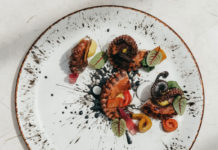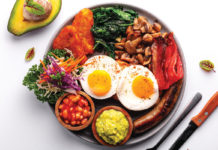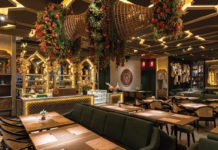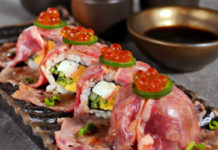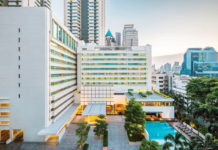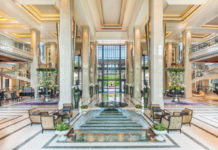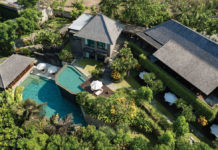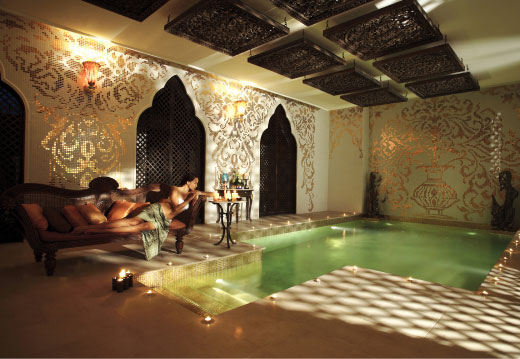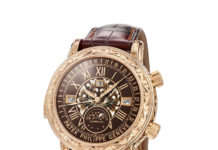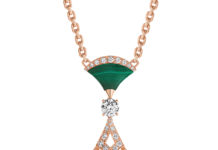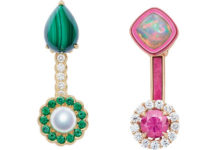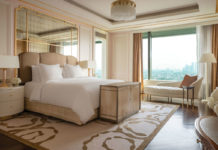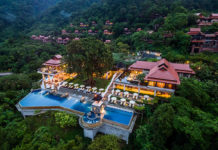SPIRITUAL & PHYSICAL PERFECTION
BASED ON THE DESIGN OF AN ANCIENT MANDALAY PALACE, THE BREATHTAKING TEAKWOOD ARCHITECTURE OF THE DHEVA SPA FEATURES A STUNNING SEVEN-TIERED ROOF DESIGNED TO REPRESENT THE SEVEN STEPS TO NIRVANA AND THE ATTAINMENT OF SPIRITUAL AND PHYSICAL PERFECTION.
Conceptualized by designer, Rachen Intawong – or “Tam” as he is best known – the gifted artist has played a pivotal part in the construction and design of Mandarin Oriental Dhara Dhevi since its inception in 2001. He sees the resort as a working museum, a place where traditional Lanna culture and Asian colonial splendor have been carefully brought together in harmony. Born in Chiang Mai, Tam was a studious child who excelled academically. He moved to Bangkok to study architecture, but soon discovered he felt out of place in the big city. “I didn’t feel right. I was so unhappy, my heart was in Chiang Mai,” says Tam, who returned to the North to pursue a degree in Thai art. Driven by a passion for the past, he immersed himself in Lanna history and art, reading widely and spending his free time visiting the region’s villages and researching lost rural architectural styles.
When the idea of the resort emerged, he and his small team worked on an idea for the project piece by piece. “There was no master plan, it was more like one big jigsaw puzzle,” he admits. “Just like the city of Chiang Mai, we built it up over a long period of time, a natural growth process.” Over many months, his team created the concept of an ancient city, around which traditional structures – wooden rice barns, royal Lanna houses and magnificent colonial mansions – were erected in small clusters providing luxury accommodation, restaurants and recreational areas. These groups of buildings borrow from specific vernacular styles such as Thai Lue or Haw Luang. Just as in an authentic Thai palace, the grounds contain paddy fields, lakes and Lanna-inspired houses. “Ultimately, we have rebuilt the past so that some of those Lanna traditions can be kept alive for the future. Change is part of life, I accept that, that’s what Buddhism teaches us, but who says we have to lose our heritage in the name of change?”
The resort’s Dheva Spa and Wellness Center is equally as grand. Featuring over 3,100 square meters, every inch is embellished with ornate moldings and sculptures depicting sacred animals and symbolic Buddhist motifs loyally recreated by over 150 local artisans from the original Burmese template in Mandalay, Myanmar. The holistic spa and Ayurvedic center offers 25 spacious treatment rooms and suites, each with a private bath, steam shower, heated marble scrub table and private relaxation table. Respect for the uniqueness of each individual is the foundation of the Spas at Mandarin Oriental. Upon arrival, you receive a private consultation with one of the spa’s health specialists or therapists, who are highly trained at the onsite academy.
Offering a multitude of Ayurvedic programs, each individual is viewed as a unique combination of elements and energy flows, called doshas. Originating in India more than 5,000 years ago, Ayurveda is believed to be the oldest healing science in existence, forming the foundation for all other types of medicine. External factors such as stress, improper diet, lifestyle and environment can cause your doshas to become imbalanced, resulting in a variety of health problems. The main objective of Ayurveda is prevention through balance. Dheva Spa’s skilled practitioners offer dosha analysis, guiding you through a personalized program of treatments that include yoga, meditation and Ayurvedic massage. Once a treatment plan is agreed upon, you are encouraged to experience the spa’s luxurious heat and water facilities, specially designed to loosen limbs and prepare your body for therapy. A selection of water therapy areas is available including a hydrotherapy room, Vichy shower, and Hammam, rhassoul and watsu pool. Whether you choose a half-day program or a full 21-day Ayurvedic journey, all treatments promise to help you achieve balance, awareness and a feeling of glowing health.
One of Dheva Spa’s most popular half-day programs is aptly named the Lanna Signature Ceremony. Revealing the hidden treasures of Chiang Mai’s beauty rituals, you are greeted with a welcome foot ritual that is symbolic of paying special homage to honored guests. A fragrant herbal steam bath follows utilizing wild forest honey from the local region. A renowned health and beauty ingredient, tamarind is the main ingredient in the ‘body glow’ scrub treatment followed by a traditional ‘Tok Sen’ Lanna massage, where the body is tapped rhythmically with a stick made from the bark of the tamarind tree. Achieve balance in bliss as your half-day concludes with a relaxing head massage.
Inspired by ancient Thai customs, the Royal Thai Ceremony is the ultimate spa experience. Many natural ingredients are used to relax, calm, cleanse and detox. Following the welcome foot ritual, Dheva Spa has created a delicious body scrub infused with Safflower Oil – known throughout Africa and Asia to enhance skin elasticity and for its ability to retain and regulate moisture. Rich in polyunsaturated fatty triglycerides, Safflower Oil contains up to 80% of a specific, rarely met kind of vitamin F, which cannot be worked up by the human body. Enjoy a steam with jasmine blossoms and body mask followed by a relaxing Thai floral jasmine bath. Your treatment concludes with a graceful and tranquilizing Royal Thai and facial acupressure massage. Used for centuries in royal Thai palaces, this treatment works on energy lines that run throughout the body, helping to release existing blockages to allow for a free flow of energy.
Once relaxation has taken effect, try the spa’s Chakra Balancing treatment, focusing on the seven chakras as subtle energy centers in the body. Each chakra is assessed for its energy level and treated with the help of healing sounds that flow through the chakra channels, clearing blocked-energy pathways to release emotions that will reconnect you to yourself.


